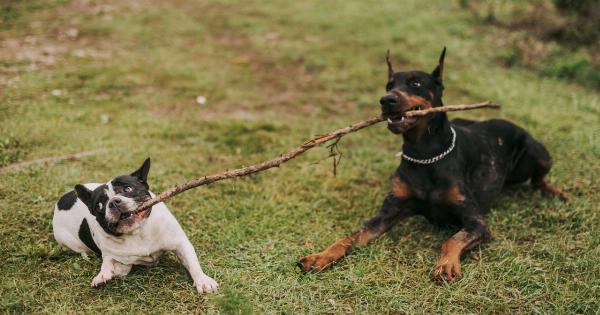Just like humans, dogs need dental care for their overall health and well-being. Dental problems in dogs can lead to pain, infection, and other health issues.
It is important for pet owners to prioritize their furry friend’s dental hygiene and schedule routine check-ups with a veterinarian.
Common Dental Issues in Dogs
Periodontal disease is the most common dental issue in dogs. This occurs when bacteria in the mouth forms plaque and tartar on the teeth.
As plaque and tartar build-up, it can cause inflammation and infection of the gums, leading to gingivitis and periodontitis. Other dental issues include broken teeth, cavities, and abscesses.
Signs of Dental Problems
It can be difficult to know if your dog is experiencing dental issues, as they may not show obvious signs of pain or discomfort.
However, there are some signs that may indicate dental problems, including bad breath, bleeding gums, loose or missing teeth, reluctance to eat or chew, decreased appetite, and pawing at the mouth.
Dental Care Options for Dogs
Regular dental check-ups with a veterinarian are crucial for maintaining a dog’s dental health. They can perform a thorough examination of the mouth and teeth, provide professional cleaning, and recommend appropriate treatment if necessary.
Additionally, pet owners can take steps at home to promote good dental hygiene, such as brushing their dog’s teeth regularly, providing dental chews or toys, and feeding a balanced diet.
Brushing Your Dog’s Teeth
Brushing your dog’s teeth is an effective way to remove plaque and prevent dental problems. However, many dogs may not be comfortable with this process initially. Here are some tips to make brushing easier:.
- Start slow: Introduce brushing gradually, starting with a few seconds and lengthening the time over several weeks
- Use flavored dog toothpaste: This can make the process more enjoyable for your dog
- Use a soft-bristled toothbrush: Avoid using human toothbrushes as they can be too harsh
- Be gentle: Brushing too vigorously can cause discomfort for your dog
- Reward your dog: Provide positive reinforcement with treats or praise after brushing
Feeding a Balanced Diet
A balanced diet is essential for a dog’s overall health, including their dental health. Proper nutrition can help maintain strong teeth and gums.
Additionally, some foods may help clean teeth naturally, such as crunchy fruits and vegetables like carrots or apples. Speak with your veterinarian to determine the best diet plan for your dog.
Dental Chews and Toys
Dental chews and toys can be a helpful addition to a dog’s dental care routine. Some options are specifically designed to help remove plaque and tartar and promote healthy teeth and gums.
However, it is important to choose chews and toys that are appropriate for your dog’s size and chewing ability to avoid the risk of choking or other injuries.
The Bottom Line
Dental care is an important aspect of overall health and well-being for dogs. Periodontal disease and other dental problems can lead to pain and discomfort, and even more serious health issues if left untreated.
Routine dental check-ups with a veterinarian, along with at-home care such as teeth brushing, a balanced diet, and dental chews and toys can help ensure that your beloved dog’s dental health stays in top shape.






























